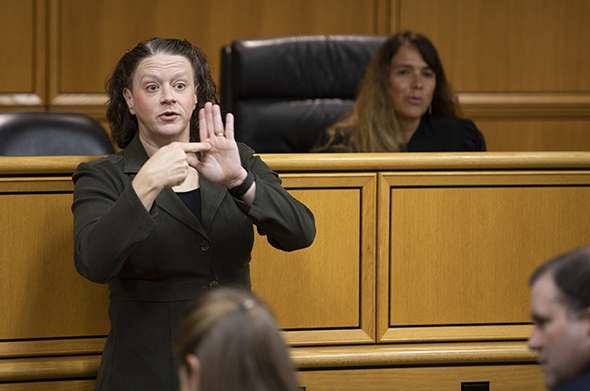Sign Language Workshop Equips Interpreters with Courtroom Skills

For the sixth year in a row, Stetson Law was the site of an innovative, intensive workshop for sign language interpreters to learn how to conduct their work in a courtroom setting.
The three-day Sign Language Interpreter Legal Training Workshop featured faculty and staff from Stetson Law’s Center for Excellence in Advocacy and the Center for Excellence in Elder Law as well as students from Stetson Law’s mock trial teams. They collaborated with professionals from Tampa-based Absolute Quality Interpreting Services as well as Columbus, Ohio-based Hallenross and Associates – two American Sign Language (ASL) interpreter services – and all of the attendees came away from the workshop with important new insights about their work in court and other legal settings.
The training was a unique opportunity for interpreters to hone their skills in a realistic, unscripted setting – and for students to experience what it is like to work on a case involving deaf or hard of hearing clients, jurors, and other trial participants, said Stetson Law Professor Jason Palmer, who helped facilitate the workshop.
“Stetson is very proud of its role as a sponsor of the Sign Language Interpreter Legal Training Workshop,” he said. “Each year, the workshop has grown in size and scope, with many interpreters returning to continue their training on legal interpreting in the courtroom. Our students also greatly benefit from the opportunity to conduct a trial with interpreters, a skill that is not readily available prior to actual practice.”
According to the Bureau of Labor statistics, there are about 11 million Americans in the U.S. who have a hearing disability – but there are less than 20,000 interpreters certified by the Registry of Interpreters for the Deaf.
Understanding the challenges of interpreting in court
Interpreters – many with decades of experience – and students alike got to see firsthand the potential issues that may arise when sign language interpretation is required in a court hearing. Participants learned how to sign legal and law-enforcement terms and how to avoid potential ambiguities. They also got to observe how a courtroom layout can affect the line of vision between an interpreter and a deaf or hard of hearing party or witness – and how to prevent visual obstruction.
“One of the significant values that our workshop provides to interpreters is the chance to learn legal terminology and courtroom dynamics in a risk-free environment,” Palmer said. “As sign language is not a word-for-word interpretation, having lawyers and interpreters talk about the objectives each have in the courtroom allows all the participants to realize the ways in which testimony can be accurately interpreted and communicated.”
One example: When a deaf or hard of hearing person on the witness stand signed in response to a question, then corrected himself with a different sign (“no,” then “yes”), some interpreters asked whether they should sign the intended answer, or sign both the incorrect and the self-corrected response.
The answer? The latter.
This way the record reflects potential uncertainty on the part of the witness.
Inviting community connections
It was also an opportunity for members of the legal community to participate in a meaningful learning experience.
Volunteers included judges who presided over the mock trials. One judge recently moved to the area from Washington State, where she had worked as a Spanish language courtroom interpreter, and then was a prosecutor and subsequently became a judge. She served on the Washington State Supreme Court Interpreter Commission, which she chaired in her final year there. Her insights into courtroom interpreting were particularly valuable to both the interpreters and the students, given her background and training.
Leaders from the ASL interpretation community said attendees once again came away from the experience with a deep understanding of their unique role in helping ensure our legal system truly ensures justice for all.
“Even though it’s been six years since the inaugural workshop, the amount of curiosity, learning and collaboration among all parties involved never ceases to amaze me,” said David Scott, co-owner of Absolute Quality Interpreting Services. “We are so thrilled that we can help empower these dedicated professionals to be the absolute best they can be when it comes to serving hearing-impaired individuals in even the most complex of circumstances.”
Post date: March 10, 2023
Media contact: Kate Bradshaw
[email protected] | 727-430-1580